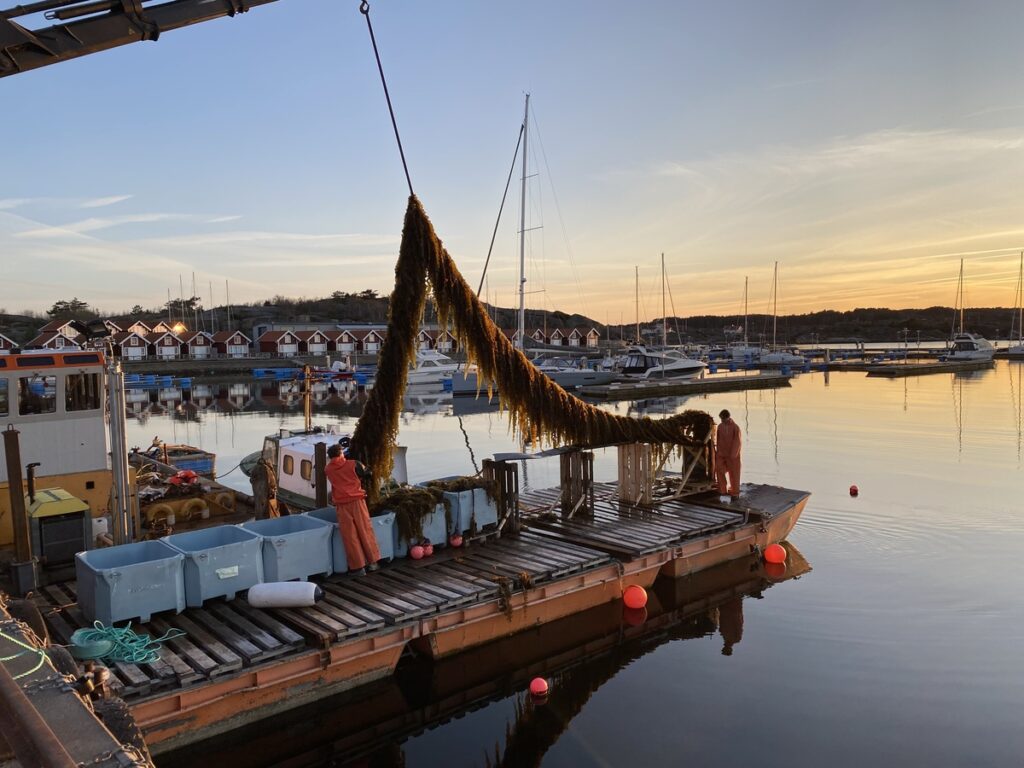Growing the seaweed franchise
You aim to expand your seaweed company KOASTAL by franchising it to other countries. How do you keep the balance between scaling, growing, and maintaining local ownership? What are the risks of scaling or expanding with such a business model?
It’s a tough question to answer due to the very layered dynamic with local owners.
We work with independent farmers. They own their farms, but in the sea, what exactly do they own? We don’t have a system like in land-based agriculture where people can own land and therefore own their farm. Farmers we work with own their boats, their dock, their operations. What we do is get a time-limited permit from the government to cultivate seaweed in the area, so it’s not that we own the area; we just have the permission to use it. We transfer that permit to the fishers, and then they own the right to cultivate for five or ten years. That’s what we mean by “local ownership” of the water body.
Then, in the first year, we typically own the equipment as a test phase, but increasingly we want them to have their equipment – anchors, ropes, buoys, and so on – and make their own decisions when it comes to operating the farm. In that sense, we try to keep as much ownership of the actual upstream production in the local communities. For us to scale, we cannot be too involved in the tangible ownership. Ownership comes with capital needs, cash flow needs, risks, and those things are not the easiest to scale. So, for us to scale to Denmark, Iceland, etc, is only possible if we keep as much of the ownership at a local level.
But the reason why it’s very layered is that what does ownership of the farm mean? Is it the equipment? Is it the permit? We might own the permit, but the water is still from the general pond. The permit system is one that we are still tweaking, and we’re not there yet. Some people say that they don’t want to own the permit, to others, it’s a dealbreaker if they don’t. We’re still finetuning a network which allows for variation where somebody can almost cherry-pick their needs.
Ownership is often a crucial element, especially for fishers who are used to being independent and wanting to keep it that way. We also see the transfer of ownership as a way to create more incentive. In some cases, if people are not involved enough, don’t have enough ownership of the operations, and there’s too little at stake, there’s no strong incentive – and ownership is at the core of the solution for that.
Communicating with the fishers to not only crucial to get the permit, but also in all your operations is crucial. Being trusted by the community, especially in these tight fishing communities, is vital. Sometimes we see other aquaculture companies coming in and saying, “OK, we’re now going to run this water, we’re going to start operations here”, but they come in as a completely external company and have a much harder time getting the support of the locals. Since we maintain ownership with the local fishers, we observe increased support for both the fishers’ activities and those of the network as a whole.
Stakeholder stewardship
How do you ensure fishing communities remain central in shaping the direction of your company?
We need farmers as much as they need us. If we are working with people who don’t feel incentivized, don’t feel that the deal is fair, then they will quit. They will neglect their farm; they won’t care anymore. And that’s healthy! You don’t want to create systems where people are too locked in.
In a value chain, you need to make sure everyone is happy, because if one link in the chain breaks, everyone suffers.
And fishers are quite good at making sure that their deal is good; otherwise, they have other options. So healthy power dynamics are built into the business model.
Collaborating with local communities
We tend to think of communities as a monolith, there are no conflicts within them, but we know that is not the case. Have you come across any such challenges when deciding who to collaborate with in a local community?
I can give an example of that from the mussel industry. There was one established mussel farmer who advocated for collaborative approaches instead of competition. However, a supplier who was already working in the sector thought he could start mussel farming on his own. He received funding to start building new systems, but they somehow managed to build the wrong ones, and they all broke down, spreading over the entire coast, completely ruining the reputation of mussel farming. Of course, that negatively affected the established mussel farmer, who was furious, because he had been building his business in a healthy way, relying on the community. So it really matters who you choose to work with!
Within the fishing community, though, I wouldn’t say that I’ve noticed that… yet!
It’s funny, in entrepreneurship, we learn a lot about marketing: that people might say that they like your product, solution, or service, but they might actually not be completely satisfied. With fishers, you never have that problem because they will say every negative thing about your service 10 times to your face, so that’s fun!
